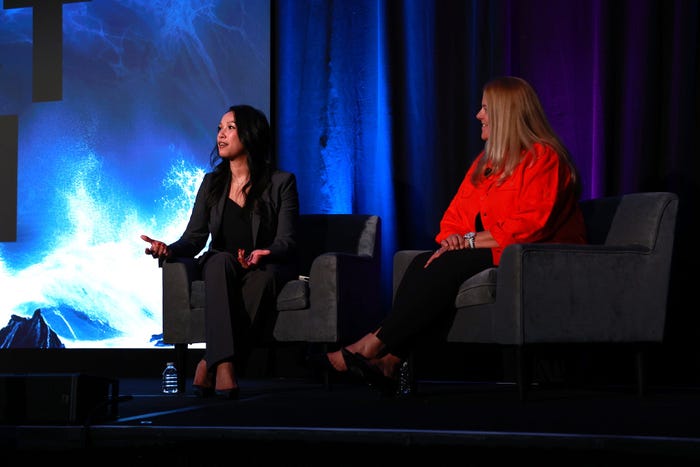How Operators, Vendors Hope to Tackle Data Center Supply Chain Woes
An integrated and adaptive supply chain is needed to compete effectively in the data center and AI market.
June 11, 2024

Supply chain issues continue to impact the data center industry. Things may have improved somewhat since the dark days of pandemic-induced delays, but shortages and long lead times persist.
Amid these ongoing challenges, the need for developers to align with major suppliers to develop tighter supply relationships is greater than ever before, delegates at this year’s Data Center World expo were told.
“We are now dealing with wars, geopolitical influence, and disruption of shipping lanes,” said Nancy Novak, chief innovation officer of Compass Datacenters, during the event, which took place in Washington, DC. “This is a new norm and a perfect storm of soaring demand, utility challenges, [and] supply chain problems.”
To compete effectively with the speed and agility needed in the data center and AI market, an effective, adaptive, and integrated supply chain is needed, Novak said.

Phanney Kim Brevard and Nancy Novak at Data Center World 2024
“Agility, resilience, visibility, and end-to-end collaboration are all very much tied together,” said Steve Banker, vice president of research at ARC Advisory Group.
While some data centers treat suppliers in a purely transactional way, others form tight partnerships with vendors and build trust. According to Rich Nagle, CISO at Ohio State University, those in the latter group will typically find themselves more able to solve market and supply-chain challenges.
“It is extremely beneficial to collaborate and leverage trusted associates and partners,” Nagle said. “The sharing of knowledge is crucial to success.”
Supply Chain Case Study: Schneider Electric and Compass Datacenters
At this year’s Data Center World, Schneider Electric and Compass Datacenters discussed how they formed a supply chain partnership to bring a new facility online within a year. The 103,000 sq.ft property, situated on Compass Datacenters’ 500-acre data center campus in Red Oak, Texas, will soon begin production of modular data center components and pre-engineered, prefabricated equipment that will be used by the customers of both companies.
This partnership streamlined the entire process, eliminated much of the upfront engineering and design work, and delivered a finished product in record time.
The partnership offered material benefits to both sides. Compass is in the business of building and operating data centers. It has the construction and equipment supply chain and expertise needed to bring a project into existence rapidly. Schneider, meanwhile, leveraged the experience of Compass to build the facility and, in return, it can now test uninterruptable power supplies (UPS) for Compass right on the same campus as well as integration services.
“Despite big changes being made to the scope of the project such as adding UPS testing halfway through the project, we were able to pull together and work it out,” said Novak. “Now Schneider Electric can test equipment and systems for us before we send them out to the customer.”
The addition of UPS testing to the to-do list meant that the facility needed twice as much power. As Compass had already negotiated IT load with the utility, it had to repurpose a lot of the equipment, relocate transformers, and find a way to make it work.
Phanney Kim Brevard, chief strategy officer and CIO of ETAP, a brand of Schneider Electric, said there was a pre-existing relationship between both companies before this project began, as Compass already provided colocation services to Schneider Electric.
“We needed a new facility as prefabrication designs were changing faster than we were able to keep up with,” said Brevard. “This project was all about how to design and build a new integration facility that was future proof and do it fast.”
Schneider Electric, she added, is in the business of manufacturing and testing power, electrical and cooling systems. It is not in the business of building data centers. It made sense to strengthen the relationship with Compass and leverage its core capabilities in real estate, construction and utility interconnects to bring the new center to market fast.
Brevard explained how the change of scope came about. The engineering designs being received from customers were getting heavier, denser, and more complex. It became apparent that Schneider Electric needed to provide stronger UPS testing capabilities. The new integration facility was the obvious place to put it even if the project had already been designed and scoped out. That tested the strength of the partnership. But both sides figured out how to make it work: Schneider Electric found ways to lower its power needs and Compass reconfigured the power configuration of the entire facility.
“This project was a response to the growing trend of equipment being integrated into larger modules before shipping it to data centers,” said Brevard.
Industry Ties
Schneider Electric’s partnership with Compass was part of a $3 billion, multi-year data center technology agreement. While this tie-up sits at the upper end of industry partnerships in terms of scale, the industry will likely witness a fresh wave of supply chain agreements as demand for digital services continues to grow.
According to Onnec Group, a UK-based IT services firm, data centers face a “triple punch” of challenges, with supply chain issues, crucial but difficult-to-reach sustainability goals, and the skills shortage all hindering growth.
“Data center teams can’t manage growing workloads alone to deliver the perfect data center,” Onnec said in its Supply Chain Challenges report (PDF).
“They need strong partners – such as skilled product suppliers and expert systems integrators – and a strong channel ecosystem to navigate supply chain management, support ESG measurement, and deliver complex data center projects through holistic design philosophies.”
About the Author(s)
You May Also Like





.jpg?width=700&auto=webp&quality=80&disable=upscale)



